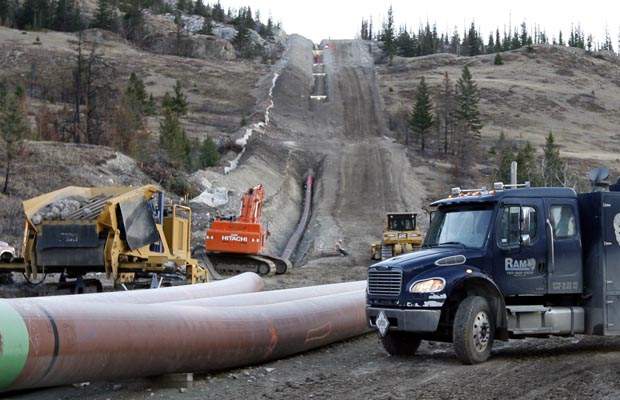The great mythology of British Columbia politics over the last 16 years has been that the four-term reign of the BC Liberal Party represented some manner of conservative — or, if you're on the BC left — "hard right" rule. No one internalized this truism more than the BC NDP, and their embrace of it will have dramatic consequences for the economy of the province they now rule — and the national one as well.
Ideology is not just some abstract thing people like me use to label and judge others. How you perceive your place on the political spectrum — and the place of your opponents — informs the ideas and tactics you're willing to entertain.
BC's Liberal government ran the province's natural resource sector in tune with Canada's dominant center-left consensus. This thinking posits that the extraction of energy from the earth is generally something that should make us anxious, given the environmental consequences, while also conceding that harvesting and delivering oil, natural gas, and hydroelectricity to those who want it provides employment and livelihoods to thousands of families.
The preferred centre-left solution, therefore, is an agenda often dubbed the "social license" doctrine. It's basically an updated version of planting a field of seedlings after harvesting part of a forest: if a government is going to enable the continued exploitation of energy resources, and thus enable the associated ills, then it must make equal effort to compensate and mitigate any damage done.
"Social license" manifests in a multitude of forms, including new taxes, increased funding for "green" energy initiatives, stricter environmental regulation of resource projects, and a willingness to veto ones deemed regressive beyond the pale. The governments of BC's Liberal premier Christy Clark and her predecessor, Gordon Campbell, were pioneers of this thinking, introducing Canada's first carbon tax, making record investments in wind and solar technology, demanding new heavy oil pipelines meet six strict "conditions" of environmental and financial assessment, and loudly opposing the high-profile Northern Gateway pipeline, which didn't.
If this agenda of social license is imagined as a philosophy of "the right," which is basically what the BC NDP allowed itself to believe, then what should be the appropriately distinct approach of the "left"? The answer, it seems, is offering an unqualified "no" to energy projects, period.
In the aftermath of BC's 2013 election, it became received wisdom that then-NDP leader Adrian Dix had blown the race by abruptly choosing to oppose the Kinder Morgan company's TransMountain pipeline expansion project (wags dubbed it his "Kinder Surprise"). The narrative posted the TransMountain pipeline as one of the good, moderate pipeline projects ensconced in plenty of social license, in contrast to one of the unambiguously wicked ones, like Northern Gateway.
Dix's stance cost the NDP "rural B.C., basically," in the words of former five-term rural NDP MLA Tim Lai, one of 2013's most high-profile victims. Former NDP premier Michael Harcourt tore up his NDP membership in protest, and another former NDP premier, Dan Miller, began writing scolding editorials with headlines like "how will we pay for stuff without the resource sector?" and "NDP must learn that you can sell oil and protect the environment."
But the party's statesmen did not win the argument. The Kinder Morgan pipeline only became more demonized in the eyes of the British Columbian hard left — particularly after chaotic protests at Burnaby Mountain in 2014 — and the party's new leader, John Horgan, ran this year's election vowing to use "every tool in the toolbox" to prevent its construction, and hinting he might support cancelling northern BC's proposed "Site C" dam, too — another increasingly popular target of left-wing demagoguery. (He says he supports natural gas, though concedes "I get a lot of grief over that.")
The result was an even starker cleavage in BC's electoral map — the NDP swept everywhere urban, where the province's energy sector is often regarded as an abstract thing one can airily oppose to demonstrate environmentalist bona fides, while the Liberals were resigned to mostly rural areas, where resource jobs are a tangible fact of life. Though the Liberals narrowly won the popular vote and seat count, last week Horgan deposed Premier Clark's minority government and formed a governing coalition with the three-seat Green Party, whose haughty leader has likened positive talk about resource jobs to promises of "unicorns in all our backyards."
Premier Horgan is a moderate man by temperament, but sits on a collision course with a pair of leaders previously regarded as two of the country's progressive heroes, Alberta Premier Rachel Notley and Prime Minister Justin Trudeau. Both favour the Kinder Morgan pipeline, believing the social license infrastructure introduced by the outgoing Liberal government provided the project with sufficiently robust moral cover. Horgan's base — and particularly his Green coalition partners — will insist he not take their "yes" for an answer, and instead expect him to promote a dogmatic agenda that, in the words of Diane Francis, transcends traditional centre-left NIMBYism in favour of full-blown BANANA — "build absolutely nothing anywhere near anyone." It does not seem an agenda born of any particularly deep thought, economic or otherwise, but rather a traditional NDP desire to always, somehow, be the most left-wing party in the room.
The BC NDP, and its orbit of union allies and far-left blogs, have spent much of the last sixteen years declaring everything wrong with the BC government to be a product of the Liberal Party's dark "ideology." The prescription evidently entails installing a government whose religion of knee-jerk contrarianism has carried it to an economic la-la land.
Photo Credit: Vancouver Sun
Written by J.J. McCullough






